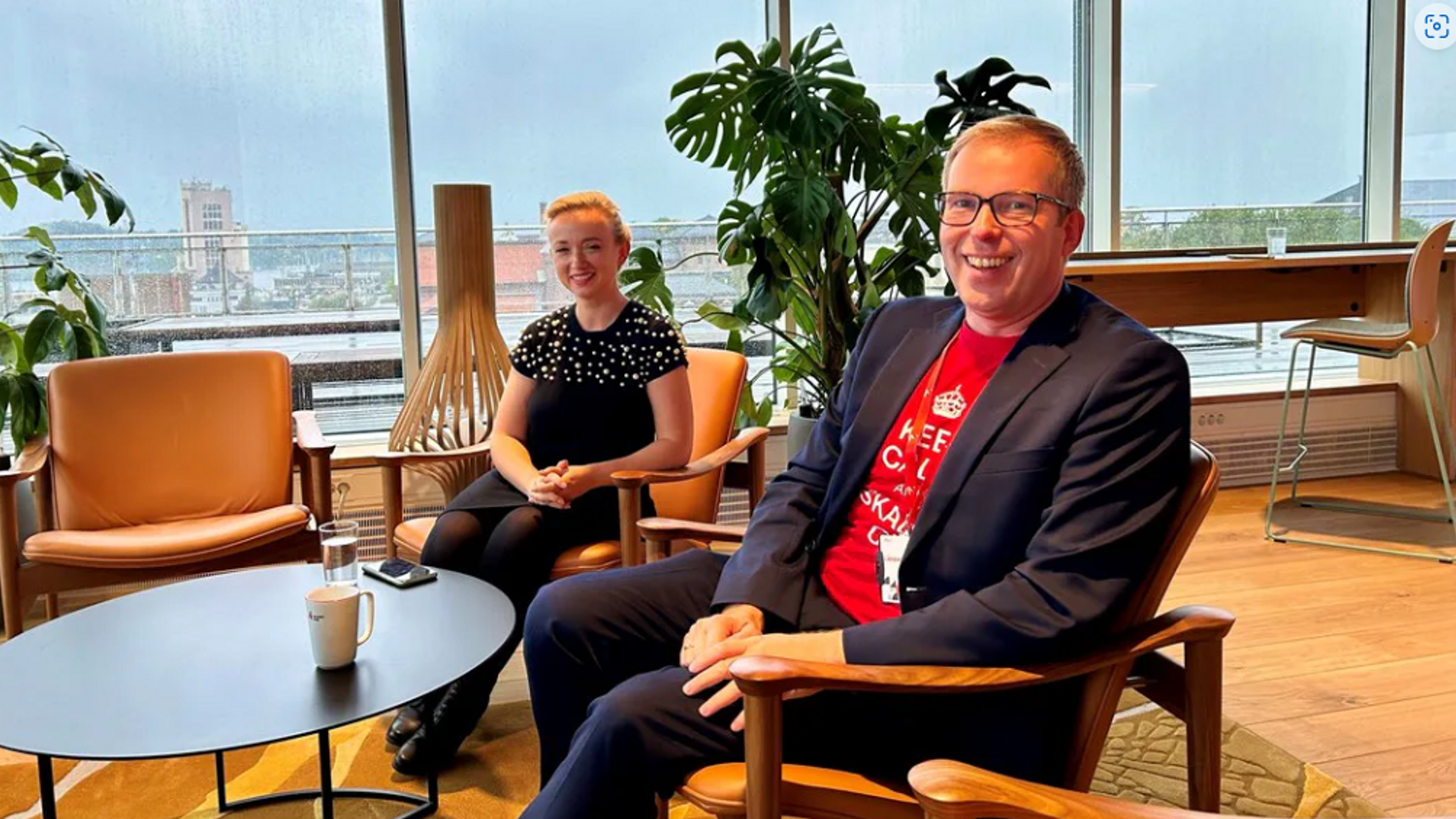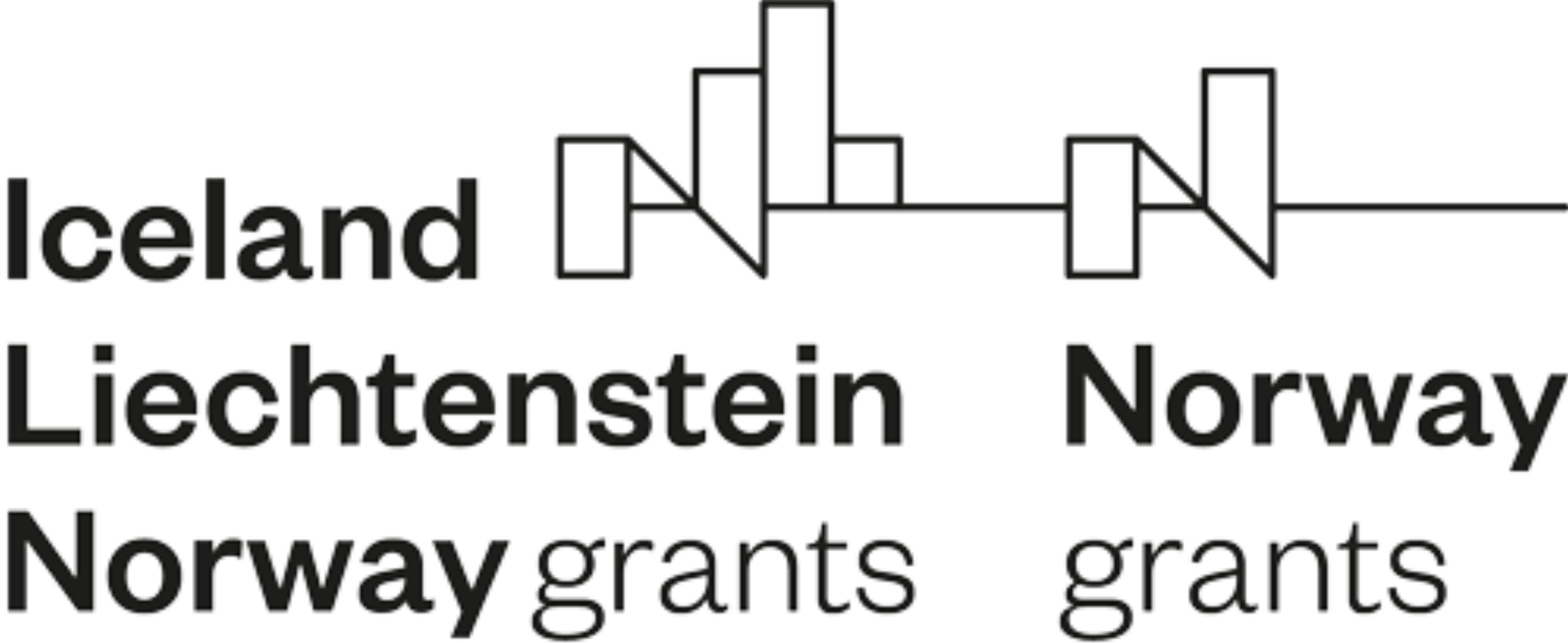Fateful Time for the EEA and Norway Grants - for Romanian Iulia Caizer, they have been a "Game Changer"
 © Innovation Norway
© Innovation NorwayAll Norwegians should know how great the EEA and Norway Grants are, says Håkon Haugli, CEO of Innovation Norway. Here he sits with Iulia Caizer, a Romanian entrepreneur, who thanks the EEA funds for making her business a reality.
– Without the EEA funds, we would not be where we are today, says Iulia Caizer, the founder of the company "Quick Legal." Support through the EEA funds has allowed Julia to finance and develop her business idea in Romania.
The Romanian lawyer had a goal of providing affordable legal services to everyone. Thus, she and two other women developed a digital tool that matches users in need of legal expertise with the right lawyer. Through algorithms and artificial intelligence, the user's needs are sorted.
«40 percent of our projects have Norwegian partners, so this is also a benefit for Norwegian businesses.»
The user's ability to pay, or any urgency, is linked to the lawyer's expertise and fees. This generates a tailored top-five list of the most suitable lawyers for each user.
– We want users to make informed choices, says Caizer. She found the EEA and Norway Grants through a Romanian incubator, which connected her with Innovation Norway's office in Romania. Then the process moved very quickly, which Caizer considers one of the advantages of the EEA and Norway Grants. She finds that the EEA and Norway Grants have flexible decision-making processes, fast disbursements, and that the support reaches where the money is needed most. Other funds, such as EU funds, she believes are more rigid and bureaucratic, and one has to wait longer for the money to arrive.
Building Bridges
"Julia's story is an example of how we try to build bridges. This is Norway's way of contributing to the EU's internal market," says Håkon Haugli, CEO of Innovation Norway. He does not believe Norway would have been as welcome in the EU's internal market without the EEA funds.
The EEA funds are part of the EEA Agreement and a contribution from Norway to reduce social and economic disparities in Europe and strengthen cooperation. The EEA funds can be compared to the EU's regional development funds, but the EU's programs are larger in terms of budget.
Innovation Norway is responsible, among other things, for the Norwegian business development programme in four countries, including Romania.
«If the situation becomes such that the office has to be closed for a period, there may be a risk that we lose employees and their expertise, experience, and valuable trust that we have built up since the office was established in 2007.»
A Greener Europe
"We contribute to a greener Europe. We also see that the EEA and Norway Grants in Romania not only promote business development there but also foster innovation beyond Romania's borders. For us, this is about more than just contributing to business profitability; it's about having a tool for long-term societal development and making the world a bit more sustainable. It makes me proud to be Norwegian that we have this program. We meet amazing people, like Julia. The fact that we can be a part of this makes me happy. Every Norwegian should know how great the EEA and Norway Grants are," says Håkon Haugli enthusiastically.
He adds that Innovation Norway's offices go to great lengths to help the businesses selected to receive support. In Romania alone, Innovation Norway has eight employees at the office in Bucharest, who provide guidance and assistance with the application process. The calls for proposals have six times more applicants than they have funds to distribute. The allocation decisions are made in Oslo as an anti-corruption measure. Only a few receive support.
Haugli also highlights how beneficial the funds are for Norwegian businesses: "40 percent of our projects have Norwegian partners, so this is also a benefit for Norwegian businesses."
READ MORE: EEA and Norway Grants: Norwegian Door Opener in Europe
Useful for Norway as well
A research report also shows the positive effects for Norway. In the government's political platform, the Hurdal Platform, a point was included stating that the government would review the impact of the EEA and Norway Grants. In February 2023, the FAFO Research Foundation submitted a report reviewing and assessing the EEA and Norway Grants.
The report indicates, among other things, that Norway's contribution to the EEA and Norway Grants for the period 2004-2021 amounted to 60 billion Norwegian kroner. It concludes, among other things, that:
- The scheme's thousands of projects have achieved good results in the recipient countries.
- The EEA funds have benefited many Norwegian participating institutions.
- The scheme is an important instrument in Norwegian European policy.
According to the report, the EEA and Norway Grants give Norway a presence and visibility in the recipient countries and access to forums for discussing key issues both bilaterally and with the EU, thereby having a security policy dimension for Norway. It is also stated that the funds lead to reduced pollution in Norway as a result of support for green transformation. However, the report describes that there is room for improvement in the effects and that actors in both recipient and donor countries want simplified administration.
Negotiations by the Ministry of Foreign Affairs The three EEA/EFTA countries and the EU began negotiations on a new period of EEA and Norway Grants on June 16, 2022. The previous period of EEA funds ran from 2014 to 2021. Projects from this period will conclude in April 2024.
The negotiations involve determining the size of the fund and the requirements that must be met by recipient countries. However, the most contentious issue in the negotiations is that there will be parallel negotiations on improved market access for Norwegian fish and marine products to the EU. Norway is likely to demand lower import tariffs for Norwegian fish, among other things, while the EU will likely hold back to protect its own markets. This could become a difficult and protracted issue that delays the negotiations.
In the meantime, both entrepreneurs, Norwegian partners, and employees in the EEA funding system must wait in uncertainty. At Innovation Norway's Bucharest office, they are trying to help as many people as possible with the funds they have before the current period expires. However, they acknowledge that the delay in negotiations could result in a gap in which they have to close the office in Romania before potentially reopening it if they receive a mandate to continue in the next period.
«If the situation becomes such that the office has to be closed for a period, there may be a risk that we lose employees and their expertise, experience, and valuable trust that we have built up since the office was established in 2007. Of course, we hope this will not happen.»
Altinget has asked the Ministry of Foreign Affairs to comment on the negotiations, but the department will not comment on the negotiations until they are completed.
«Traditionally, Eastern countries have looked towards Western countries, but they should look northward to the Nordic countries. That can be a game-changer.»
Facts
Through the EEA and Norway Grants, Norway contributes to social and economic equality in the European Economic Area (EEA). The EEA and Norway Grants are also intended to strengthen cooperation between Norway, the other donor countries Iceland and Liechtenstein, and the 15 recipient countries in the Baltic region, Central, and Southern Europe.
Since 2004, the support has been consolidated into two schemes that together constitute the EEA and Norway Grants. One scheme is funded solely by Norway (Norway Grants), while the other scheme (EEA Grants) also includes contributions from Iceland (3 percent) and Liechtenstein (1.2 percent). Norway's share accounts for nearly 98 percent of both schemes combined.
The size of the contributions is negotiated between Norway and the EU.
The legal basis for the EEA funds is Articles 115–117 of the EEA Agreement.
Source: regjeringen.no
This interview was conducted by Håkon Haugli in the Norwegian news paper Altinget. Read the Norwegian story here!
